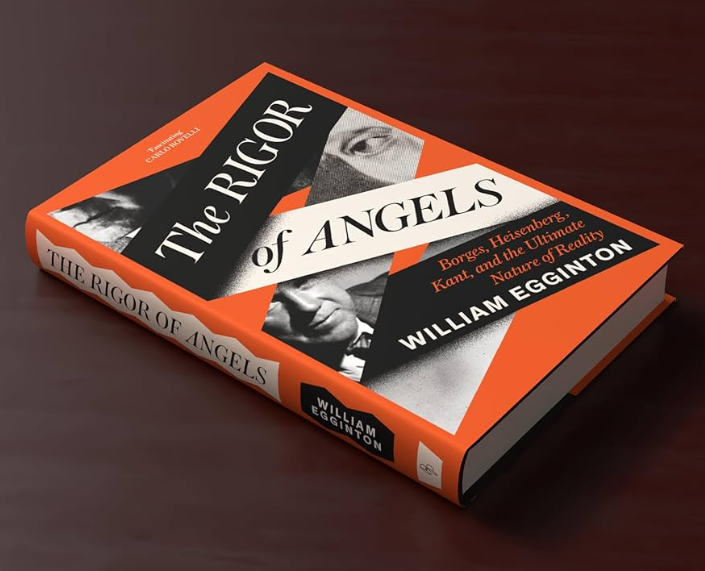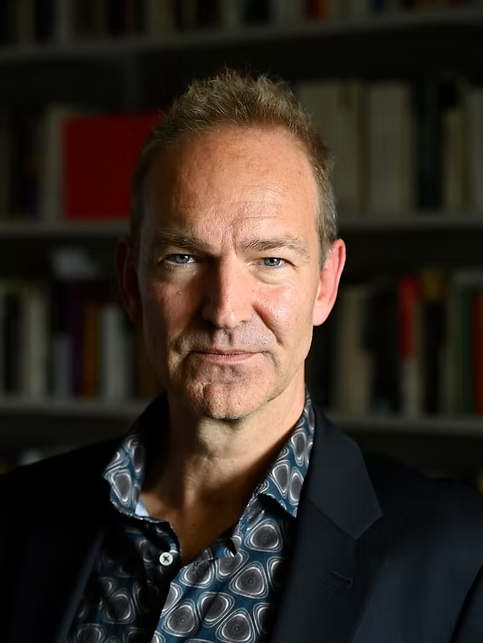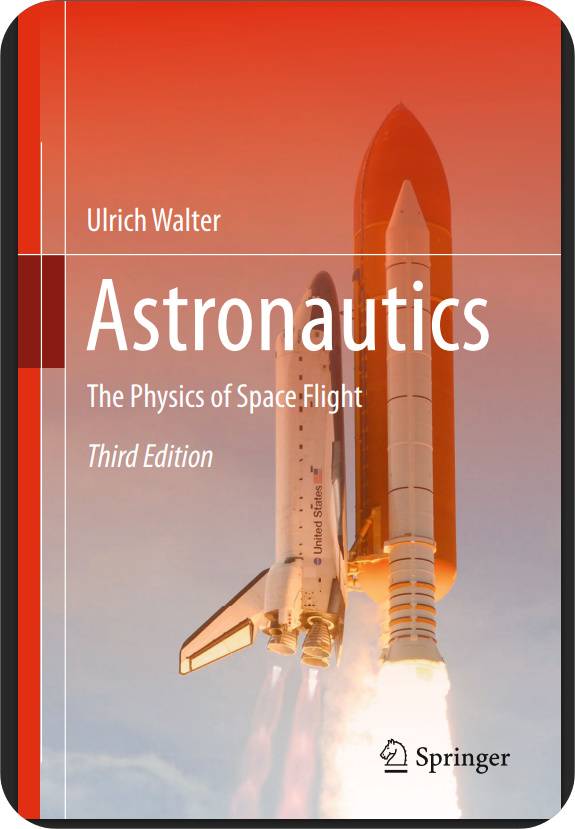
I’ve always been drawn to the meeting points between literature, science, and philosophy, and to the big ideas that shape how we understand the world. Egginton’s work centers on literature, intellectual history, and the intersections between literature, science, and philosophy. Those are areas I’m drawn to as well, which is probably why I decided to read, The Rigor of Angels. The book, written by William Egginton was first published in 2023.
The author has woven together the ideas of not only the three brilliant minds, Heisenberg, Kant, and Borges, but also included others of the same stature, names like Bohr, Schrödinger, Zeno, Einstein in the mix, to show that our understanding or universe and ourselves will always be incomplete.
I enjoy reading dense books, by dense, I mean ones that require effort, patience, and deep thinking to fully understand and appreciate. I picked up this book because I really wanted to know what a German physicist revolutionizing quantum mechanics, an 18th-century Prussian philosopher, and a 20th-century Argentine librarian could possibly have in common. Egginton’s genius lies in revealing their shared obsession, which is, the dangerous human tendency to confuse how we experience reality with reality itself.
How a Pilot, a Philosopher, and a Librarian Bent the Rules of the Universe
The book starts with Charles Lindbergh, an American pilot making headlines while crossing the Atlantic in 1927. At the same time, Werner Heisenberg was quietly dismantling our classical understanding of the universe in Copenhagen. His discovery that electrons seem to “jump” orbits without traveling between them, challenged the overall assumption of humankind that things exist independently of our observation of them.
The author then takes us to Immanuel Kant, who was wrestling between his philosophical mind and digestive issues in 1776. His “Critique of Pure Reason” wasn’t just academic posturing, in fact, it was a desperate attempt to save human knowledge from collapsing into either pure skepticism or blind faith. Kant realized that our perceptions aren’t photographs of the world, but
“versions of things that we construct in our minds by shaping them in space and time”.
The author then talks about Jorge Luis Borges, a 20th-century Argentine librarian and writer. After his heart was shattered by Norah Lange, he channeled his anguish into stories related to the deepest puzzles in modern physics. He developed deep fascination with Zeno’s paradoxes and his characters Ireneo Funes, cursed with perfect memory, couldn’t think because thinking requires forgetting, generalizing, abstracting, overlooking differences to find patterns.
The Four Antinomies: Where Reason Meets Its Limits
The author has structured his exploration around four fundamental paradoxes that arise when we forget the limits of human knowledge. It’s like each offering a different lens on how we try to make sense of the world.
The Paradox of Space and Time
This section surfaces an interesting question, can things or entities be split-up into tiny pieces forever (infinitely divisible) or made of separate, distinct parts (discrete chunks)?
Then, it mentions Zeno’s paradox, which is an old puzzle where Achilles can’t catch the tortoise because, according to the idea, he would always need to cover half the remaining distance first, then half of the remaining half, and so on. This shows how our way of thinking about space and time might make things seem endless or confusing.
Next, it explains that this paradox isn’t just a fun riddle but shows how humans tend to imagine or think about the world in certain ways.
Finally, it talks about a science discovery by Werner Heisenberg. He found that if you look very closely at tiny particles, trying to see where they are, you can’t precisely know how fast they are moving. The very act of checking the particles changes what you know. This means that our process of observing sets some limits on what we can know about tiny things.
The Problem of First Causes
The author then asks whether there is a basic, unchanging existence behind everything, something that exists without needing anything else to happen first. The book mentions Einstein, who spent his later years trying to find a single theory that explains everything in the universe. However, Niels Bohr, another scientist, joked that we shouldn’t try to tell nature or the universe exactly how it must behave (“stop telling God what to do”).
Based on the strange rules of quantum mechanics, our most precise way of understanding tiny particles-cause-and-effect relationships might not work the way our common sense expects. Things might be more unpredictable or different from how we usually think about causes leading to effects.
The Boundaries of Everything
Next, the author suggests inquiring if the universe has a boundary or edge. It uses the idea from Borges’s story about the “Library of Babel”, which is a huge library that contains every possible book you can imagine, made up of all combinations of letters. Although the library is very large and seems endless, it is actually finite in size. This is similar to how Einstein described space and time as being curved, meaning they are not flat and straight but bend around objects like stars and planets.
When scientists look out into space and try to see what’s at the “edge” of the universe, they aren’t actually seeing an end. Instead, they are peering back in time toward the Big Bang, which is the start of everything, the beginning of space and time itself. So, the universe might not have an edge like a wall, instead, it could be infinite or curved in such a way that there is no literal border.
Free Will vs. Determinism
The author then questions whether we truly have the ability to make free choices. Sam Harris says no, because if everything about a person’s brain and body were exactly the same as someone else’s, then they would be that person. So, our choices are just the result of facts about us, not something we control freely. However, Egginton points out that Harris’s argument relies on imagining a perspective like that of a god, an all-knowing, outside view, which humans cannot actually have. So, Harris’s reasoning is based on an idea that is impossible for regular people.
Despite feeling like you’re making a free decision, these underlying influences guide your choice without your awareness.
Being “You/Me” Means Skipping Some Details
What struck me most about Egginton’s approach is the way he transforms a problem or limitation into something special. When Heisenberg discovered that we don’t observe nature exactly as it is, but rather through the way we ask questions and look at it, he wasn’t making science seem smaller or less important. Instead, he was showing how powerful and meaningful science really is because it opens up new ways of understanding the world.
The quantum Zeno effect, mentioned in the book, is a phenomenon where tiny particles called ions stop “jumping” from one state to another if they are watched very closely all the time. This idea suggests that in the universe, the simple act of watching or measuring something actually affects what happens. To observe something, you need to look at different points in space and time, like taking snapshots at different moments.
Instead of a universe where everything is known all at once, this concept shows that the universe is more like something that unfolds slowly and is understood step by step, especially by creatures like us who can’t see everything at once but must gather knowledge piece by piece as time goes on.
Borges captured this beautifully in “The Aleph”, which is a made-up point in space that holds every possible point inside it. This means someone looking at the Aleph can see everything that exists all at once, like every letter on every page at the same time. However, Egginton argues that if someone actually could see everything all at once, it would ruin their sense of being themselves. This is because feeling like “me” or having a sense of self depends on noticing small differences and ignoring others, so that all these little things can come together into a single, unified person over time. Without ignoring minor differences, you wouldn’t be able to perceive a stable self, just a chaotic flood of all details at once.
Clarity Needs a Little Blur
Another profound insight emerges through the story of Solomon Shereshevsky, a journalist who could remember everything verbatim. This might sound impressive, but it can actually be a problem as he gets overwhelmed by all the tiny details and finds it hard to see the bigger picture or general ideas. This is similar to a story about a man named Funes, who remembered everything but struggled to think abstractly or understand bigger concepts because he focused on every small difference.
In human thinking, this is not a mistake but a natural part of how our minds work. We tend to forget many of the small details so that we can see patterns and common features. For example, even though every cup of coffee is different, we recognize them all as “coffee” because we ignore the minor differences and focus on what they have in common. This ability helps us understand and navigate the world.
Heisenberg realized that when we define words too precisely and rigidly, we lose the ability to see the complex relationships between words and ideas. To truly understand the world, our tools, like memory, language, and observation, have to be somewhat “blind” to certain details. This selective forgetting or focusing is necessary for making sense of the vast and complicated reality around us.
We Can Never Know Everything
The author then presents an interesting take, where he says that humans have this strong desire to control or be like a god, especially when dealing with strange ideas from quantum physics. One idea, called the Many-Worlds Interpretation, suggests that every time we make a decision or observe something, the universe splits into many different versions, each containing one possible outcome. It’s like a branching tree where all options happen somewhere in some universe.
Borges imagined a similar idea long before science formalized it, a maze in time where all different choices happen at once, and people live through all these different paths together.
Egginton, however, argues that both the idea that all choices happen somewhere (Many-Worlds) and the idea that our choices are predetermined by past events (determinism) rely on the impossible assumption that we can have complete knowledge of everything outside ourselves. In other words, to truly understand all possibilities or know every decision before it happens, you’d need to see the whole universe from outside, which is impossible for any person.
Our inability to know exactly what we will decide tomorrow, or why others behave as they do, isn’t a failure, rather, it reflects that we are free to choose and must live with the uncertainty and regret that can come with that freedom.

When Physics Meets Philosophy Meets Poetry
What makes this book extraordinary is how Egginton shows that the complex ideas in quantum physics can help us understand deep parts of human life. When scientists like Heisenberg found out that tiny particles don’t have definite properties until we look at them, it shows that reality depends on how we observe it. In other words, things only become definite when someone measures or observes them.
This idea links to a philosophy by Kant, who said that space and time are not built into things themselves, but are ways our minds organize experience so we can understand anything at all. Without these frameworks, we wouldn’t be able to perceive or make sense of the world.
Borges, who thought that true eternity isn’t endless time, but a perfect moment of everything happening all at once, like a quick flash that contains all of existence. However, this kind of eternity would actually erase our feeling of passing time because it’s so complete that there’s no longer a sense of movement or change.
Ultimately, the discovery of cosmic microwave background radiation by Penzias and Wilson is like a window into the very beginning of the universe. Looking at this radiation is similar to Dante’s idea of the heavens (Paradiso), where observing the universe is like looking inward to its origin, connecting the vast cosmos to the essence of where everything began.
Takeaway(s)
Reading “The Rigor of Angels” left me with several insights that continue to percolate:
- Embrace Productive Ignorance: Our greatest scientific and philosophical achievements don’t come not from claiming that we have or understand the “total knowledge”, but from acknowledging our inherent limitations. In fact, the uncertainty principle isn’t a limitation, it’s a revelation about the nature of reality itself.
- Question Your Assumptions: What we take to be obvious features of reality, which is, space, time, causation, consciousness, are actually projections of the way our minds organize experience. Understanding this doesn’t make these things any less real, but it prevents us from thinking that how we see them is the only or the ultimate truth, as if we have a perfect, all-knowing view of everything.
- Value the Partial View: The fact that we can only observe reality from within it, never from some impossible external vantage point, isn’t a cosmic joke, it’s what makes knowledge, choice, and consciousness possible in the first place.
- Appreciate Complementarity: Just as quantum phenomena require both wave and particle descriptions, human experience requires multiple, sometimes contradictory perspectives. Trying to explain everything with just one method or idea isn’t always correct, it shows a bias or a preference for that one way of thinking over others.
- Find Freedom in Finitude: Our inability to predict our own future choices or fully understand others’ motivations isn’t evidence that free will is an illusion, it’s the very condition that makes freedom possible.
Human knowledge is limited and will always be. We cannot remember everything perfectly or predict our own future choices with certainty. But this isn’t a tragedy, in fact, it’s the very condition that makes science, philosophy, literature, and consciousness possible. That is the human way of engaging with the mystery of existence.
This is one of those profound works that will stay with you long after you close it. It’ll leave its mark on you and perhaps point you in every direction where wisdom reminds you to remain appropriately humble before the magnificent complexity of being human in a universe that refuses to be fully known.



